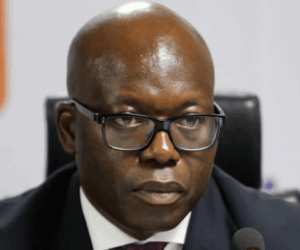Kunle Ahmed, Chairman Nigerian Insurers Associations (NIA); Usman Jankara Jimada, the deputy commissioner for Insurance at NAICOM; Babajide Olatunde-Agbeja, chairman, African Insurance Brokers Association (AIBA) and Bimbo Onakomaiya, MD/CEO of PeakThrust Insurance Brokers Limited at the 5th CHINET Aviacargo Conference at the 21st Akwaaba African Travel Market in Lagos
The Nigerian Insurance Industry Reform Act 2025 (NIIRA 2025) has far-reaching implications for the aviation sector, according to stakeholders in the aviation and insurance industries.
Usman Jankara Jimada, Deputy Commissioner for Insurance at the National Insurance Commission of Nigeria (NAICOM), described the Act as a landmark legislation that has elevated the insurance industry to a pivotal position in the Nigerian economy.
Speaking at the 5th CHINET Aviacargo Conference at the 21st Akwaaba African Travel Market in Lagos, Jimada highlighted the key provisions of NIIRA 2025, including the establishment of the Insurance Policyholders Protection Fund.
Read also: Valuation for insurance and the Nigerian Insurance Industry Reform Act (NIIRA) 2025
“The Insurance Policyholders Protection Fund is a safeguard that ensures claims are settled in the event that insurers are unable to do so, thereby eliminating the risk of companies failing to settle claims,” he explained.
Jimada, who represented Olusegun Ayo Omosehin, Commissioner for Insurance and CEO of NAICOM, emphasized that the insurance policy is now aligned with its intended purpose.
“It is designed to protect air passengers in the event of unforeseen circumstances. With the Fund in place, policyholders can rest assured that their claims will be settled promptly,” he said.
The reform has also introduced a risk-based supervision framework, which enables NAICOM to supervise insurance institutions based on the risk they pose to the financial sector.
Additionally, the new gold standard stipulates a shorter timeframe for settlement of claims, reducing it from 90 days to 60 days. Jimada noted that this timeframe is subject to NAICOM’s regulatory oversight, and the Commission may issue guidelines that supersede the 60-day limit.
“We believe that insurers can settle claims even faster, and we may consider reducing the timeframe to 45 days for the aviation sector,” he said.
Jimada emphasized that NIIRA 2025 penalizes delay in settlement of claims, and insurers who fail to settle claims within the stipulated timeframe will be penalized. “Defaulters will not only face penalties but also compounded interest on the claims amount,” he added.
He highlighted the importance of ensuring that stakeholders receive value for their insurance products and noted that the reforms have led to faster claims settlement in the aviation sector compared to their foreign counterparts.
Bimbo Onakomaiya, MD/CEO of PeakThrust Insurance Brokers Limited, observed that the aviation and insurance industries are becoming increasingly robust, particularly with the advent of NIIRA 2025. She emphasized the critical role of the transportation industry in the Nigerian economy and the need for synergy between the insurance and aviation industries.
“As insurers, we must provide coverage that promotes business confidence and mitigates risks. The aviation industry is not immune to risks such as piracy, and it is essential that we work together to address these challenges,” she said.
Read also: AIICO Insurance targets N19.6bn profit on rising investment income
Onakomaiya highlighted the importance of group life insurance, group personality accident insurance, and other forms of insurance coverage for human capital in the aviation industry.
“Emerging synergies between the insurance and aviation industries will enhance safety and deepen Nigeria’s competitiveness in the global aviation industry,” she added.
She noted that Nigeria has a significant number of registered aircraft, airports, and airstrips, and a strong insurance backing is essential to support the growth of the industry.
“There is a need for collaboration between the insurance and aviation industries to achieve better results. When both industries work together in synergy, we can expect improved outcomes,” Onakomaiya concluded.









